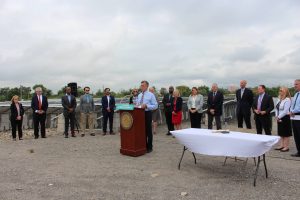DNREC Secretary Shawn M. Garvin speaks at an event announcing the release of the state’s updated energy plan./DNREC photo
Strategies Identified to Address Energy-Related Challenges While Continuing to Transition to Clean Energy Sources
The Delaware Department of Natural Resources and Environmental Control has released an updated energy plan to help guide the state as it works toward continuing to reduce greenhouse gas emissions and transition to clean energy sources.
“The 2024-2028 Delaware State Energy Plan maps out strategies we can deploy to meet the state’s energy and emissions reduction goals while maintaining a reliable and resilient grid and increasing energy justice in disadvantaged communities,” said DNREC Secretary Shawn M. Garvin.
The state energy plan was last updated in 2009.
In 2022, the state legislature expanded the Governor’s Energy Advisory Council to 25 members and tasked it with providing recommendations to the DNREC State Energy Office for updating the plan.
In 2023, the GEAC held 25 public meetings, five meetings of the full Council and each of four workgroups, and gathered public input at three public engagement sessions. The GEAC then met in January 2024 to review and approve 82 recommendations (which are summarized in the Council’s 2023 Activity Report), and held additional public outreach meetings in August.
“The new Delaware Energy Plan is the beneficiary of the input from a broad range of Delawareans who serve on the Governor’s Energy Advisory Council, and from members of the public who attended the Council’s meetings or public information sessions,” said GEAC Chair Ed Kee. “Real goals and strategies emerged that will be useful to Delawareans in the face of ever-changing, energy-related challenges over the next five years.”
The newly updated plan notes that Delaware is in the midst of a far-reaching energy transition, and the energy systems we rely on to power and heat our homes, meet our transportation needs and power commerce and industry are facing unique challenges, including reducing climate impacts, increasing the use of renewable energy, improving energy efficiency, addressing issues of energy justice, adapting the power grid to changes in generation and distribution of power and preparing our workforce to meet our changing energy needs.
The plan identifies five overarching action categories:
- Energy Justice that addresses historical causes of energy inequality and the associated health, social and economic burdens.
- Renewable Energy and Clean Technologies that centers on the carbon-free generation essential to achieving goals identified in the Climate Change Solutions Act.
- Energy Efficiency and Beneficial Electrification in homes and businesses to enable achievement of the state’s greenhouse gas emissions reduction goals.
- Grid Modernization to overcome new and emerging challenges to grid reliability and take advantage of new energy opportunities.
- Workforce Development to ensure Delaware’s workforce is prepared to meet the demands of a clean energy future.
DNREC Secretary Garvin noted that the plan is best understood as a living document.
“Conditions will evolve, and new technologies will be developed,” he said. “So, while our energy and climate planning efforts require looking ahead as far as 2050, this iteration of the plan is designed to guide toward our goals for the next five years.”
About DNREC
The Delaware Department of Natural Resources and Environmental Control protects and manages the state’s natural resources, protects public health, provides outdoor recreational opportunities and educates Delawareans about the environment. The DNREC Division of Climate, Coastal and Energy uses science, education, policy development and incentives to address Delaware’s climate, energy and coastal challenges. For more information, visit the website and connect with @DelawareDNREC on Facebook, Instagram, X (formerly known as Twitter) or LinkedIn.
Media Contact: Michael Globetti, Michael.globetti@delaware.gov or Jim Lee, JamesW.Lee@delaware.gov
###
